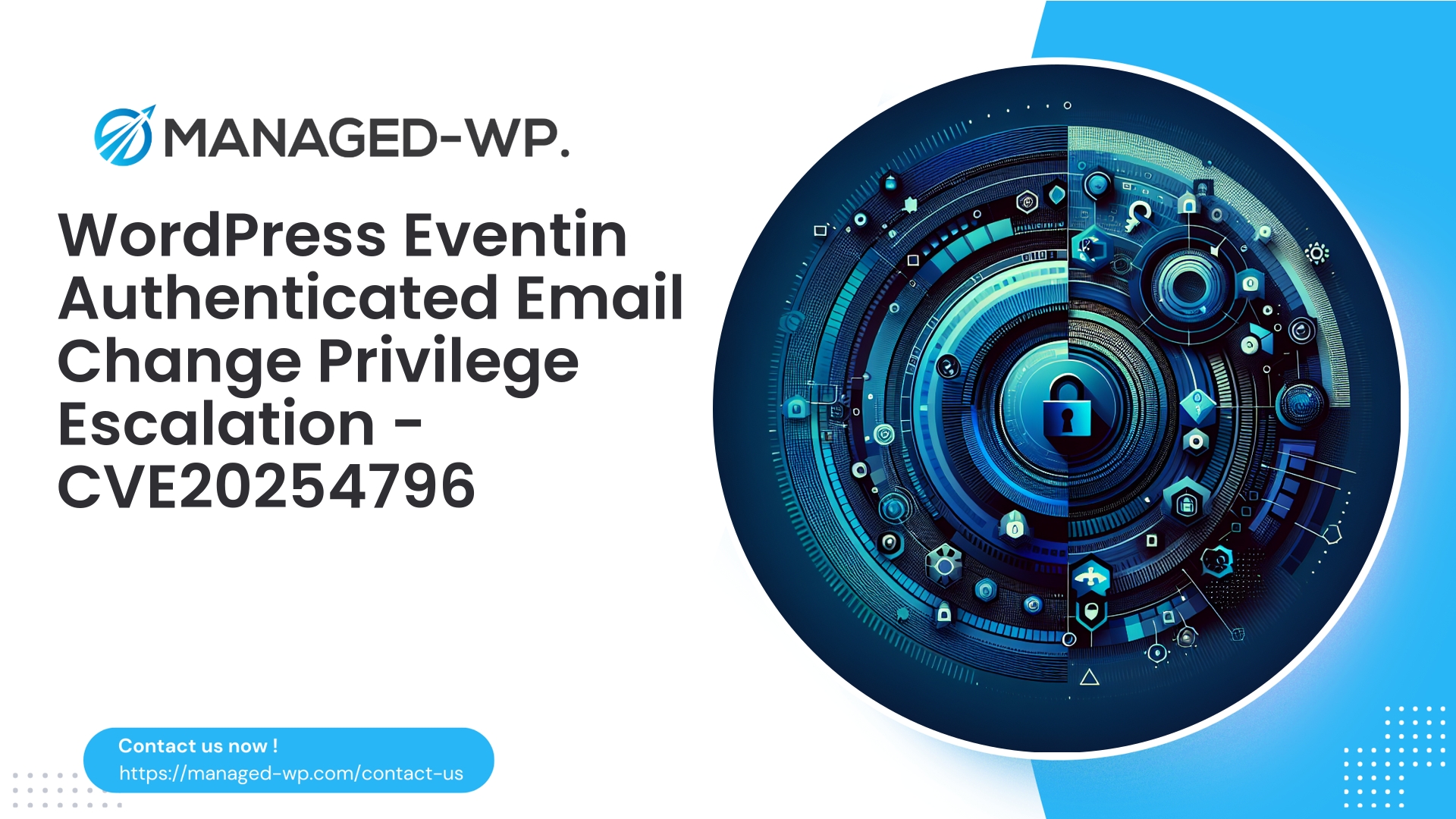| Plugin Name | Eventin |
|---|---|
| Type of Vulnerability | Privilege Escalation |
| CVE Number | CVE-2025-4796 |
| Urgency | Medium |
| CVE Publish Date | 2025-08-08 |
| Source URL | CVE-2025-4796 |
Critical Privilege Escalation Vulnerability in WordPress Eventin Plugin ≤ 4.0.34: Essential Insight from Managed-WP Security Experts
As WordPress continues its dominance as the leading website platform, ensuring the security of your plugins is absolutely vital. Managed-WP, trusted US-based WordPress security professionals, bring you a deep analysis of the newly disclosed critical vulnerability impacting the Eventin plugin, versions 4.0.34 and earlier. This security gap allows authenticated users with as little privilege as Contributor to escalate their access rights — exposing your entire website to potential takeover risks.
In this expert briefing, we’ll outline the vulnerability’s mechanics, the risks posed, likely attack methods, and clear, actionable steps for WordPress site owners to defend their assets. Leveraging Managed-WP’s advanced threat intelligence and web application firewall (WAF) expertise, our guidance ensures you are positioned to neutralize this threat effectively.
Deconstructing the Vulnerability: Privilege Escalation via User Email Manipulation
This vulnerability centers on a privilege escalation flaw within the Eventin plugin (version 4.0.34 and below). A user holding Contributor-level permissions or higher can exploit the plugin’s user email change mechanism by bypassing critical validation steps. This weakness permits unauthorized elevation of access roles.
Implications in Practice
- Contributor Role Basics: Contributors can create and manage their posts but do not have publishing capabilities or administrative control.
- Exploit Path: Exploiting weak authorization checks, contributors can manipulate their own email updates to elevate their privileges to administrative levels such as Editor or Administrator.
- Resulting Consequences: Once elevated, attackers can control website content, install backdoors, exfiltrate sensitive information, or lock legitimate users out.
This vulnerability significantly expands the threat surface since Contributor accounts are commonly allowed for user registrations, exposing many sites to practical exploitation.
Technical Analysis: How the Exploit Works
The root cause lies in improper verification of email change requests. WordPress natively enforces permission and identity checks when a user updates their email address to validate legitimacy.
However, within affected Eventin plugin versions:
- User capability validation is insufficient or bypassed during email update processing.
- Authorization boundaries are not robustly enforced, allowing low-permission users unauthorized privilege gains.
- A race condition or logic flaw enables email modification to trigger unintended role upgrades.
This vulnerability aligns with A7: Identification and Authentication Failures in OWASP’s Top 10 security risks, emphasizing the critical need for strong identity assurance mechanisms.
Potential Impact: Why This Matters to WordPress Site Owners
Privilege escalation vulnerabilities can have catastrophic effects because:
- Complete Site Control at Risk:
The attacker gains capabilities to alter site files, create malicious backdoors, steal data, or deface pages, thereby damaging reputation and SEO. - User Data Privacy Threatened:
With higher roles, attackers can access, export, or corrupt customer and subscriber information — risking compliance violations such as GDPR. - Automated Exploitation at Scale:
Contributor accounts are often easy targets for automated bots that exploit this flaw across thousands of sites. - Business & Financial Consequences:
Recovery costs, loss of customer trust, and blacklisting from search engines may follow a successful breach, sometimes leading to business closure.
Given a CVSS score of 8.8, this vulnerability demands urgent remediation.
Who Should Be Concerned?
- Any WordPress site running Eventin plugin versions 4.0.34 or older.
- Sites permitting user registrations with Contributor or higher roles.
- Websites yet to apply the patch released in version 4.0.35.
If your event or content management depends on Eventin, and you have not updated recently, your site remains dangerously exposed.
Recommended Actions from Managed-WP Security Experts
- Immediately Update to Eventin Version 4.0.35 or Newer
Ensure you run the patched plugin that closes this authorization weakness in the email change workflow. - Conduct a Thorough User Role Audit
Verify that Contributor roles are carefully assigned and audit all accounts for unnecessary privilege grants. - Restrict Sensitive Plugin Features
Where possible, limit critical functionalities like user email modifications to trusted roles only. - Deploy a Managed Web Application Firewall (WAF)
Implement a WAF capable of virtual patching and live exploit mitigation to protect your site until patches are applied. - Monitor Site Logs Vigilantly
Track unexpected user email changes or role escalations, especially by Contributors.
Virtual Patching and WAF: A Critical Layer of Defense
Given the complexity of some WordPress environments, immediate plugin updates may not always be feasible. Managed-WP strongly recommends utilizing virtual patching via an advanced WordPress WAF.
Virtual patching intercepts and blocks exploit attempts targeting known vulnerabilities at the gateway level, providing protection without modifying the site code or interfering with operations. Advantages include:
- Instant mitigation against exploitation attempts before patches are installed.
- Safeguards against zero-day and emerging threats.
- Continuous rule updates from real-time threat intelligence.
Attack Scenario: A Realistic Risk Illustration
Imagine your site allows Contributors to submit event listings or content. An attacker signs up as a Contributor and silently exploits the email change vulnerability by modifying their email to manipulate their permissions.
Due to the plugin’s flawed checks, this Contributor silently escalates to Administrator level, then proceeds to infiltrate your site with malicious backdoors, steal data, or deface content—all without your immediate knowledge.
This scenario highlights the danger posed by even seemingly low-risk user roles when plugin security is compromised.
Strengthening Your WordPress Security Posture
WordPress powers close to half of all websites worldwide, making it a prime target for cyber threats. Plugin vulnerabilities remain a primary attack vector.
Managed-WP advises adopting a layered security strategy including:
- Hardened server configurations
- Comprehensive application firewalls
- Regular malware scanning and removal processes
- Strict user access control policies
- Continuous monitoring and incident response readiness
This balanced approach minimizes your exposure to privilege escalation and other sophisticated attack methods.
Empower Your Defense with Managed-WP Security Services
Keeping your WordPress environment secure transcends just updating plugins. Managed-WP offers advanced security solutions incorporating real-time intrusion detection, proactive vulnerability scanning, virtual patching, and expert remediation support.
Get Started with Managed-WP’s Free Protection Plan
For website owners aiming to start with robust baseline protection, the Managed-WP Free Plan provides:
- Managed Firewall & WAF including continuous security rule updates
- Unlimited bandwidth with no throttling
- Automatic defenses against OWASP Top 10 threats, including privilege escalation exploits
- Powerful malware detection capabilities
This plan serves bloggers, startups, and small businesses looking for expert-level security without upfront investment. Comprehensive upgrades with malware removal, IP blacklisting, and automated virtual patching are also available.
Learn more and sign up today at https://managed-wp.com/signup.
Conclusion: Prioritize Vigilance and Proactive Security
Security is an ongoing process requiring continuous attention, not a one-time fix. The Eventin plugin’s recent privilege escalation vulnerability is a stark reminder that attackers relentlessly seek new weaknesses.
Bottom line: Keep all WordPress plugins current, maintain strict user role governance, and deploy a sophisticated WordPress firewall that provides real-time protection and virtual patching capabilities.
Your website represents your brand, business, and community—don’t risk it being compromised through avoidable privilege escalations or worse.
Additional Resources for WordPress Security
- WordPress Role Management Best Practices
- How Web Application Firewalls Prevent Privilege Escalations
- Securing Contributor and Subscriber Accounts in WordPress
- Understanding OWASP Top 10 Risks for WordPress Plugins
- Incident Response Strategies Post WordPress Compromise
Stay informed. Stay protected. Shield your WordPress site with Managed-WP’s expert security solutions.



















